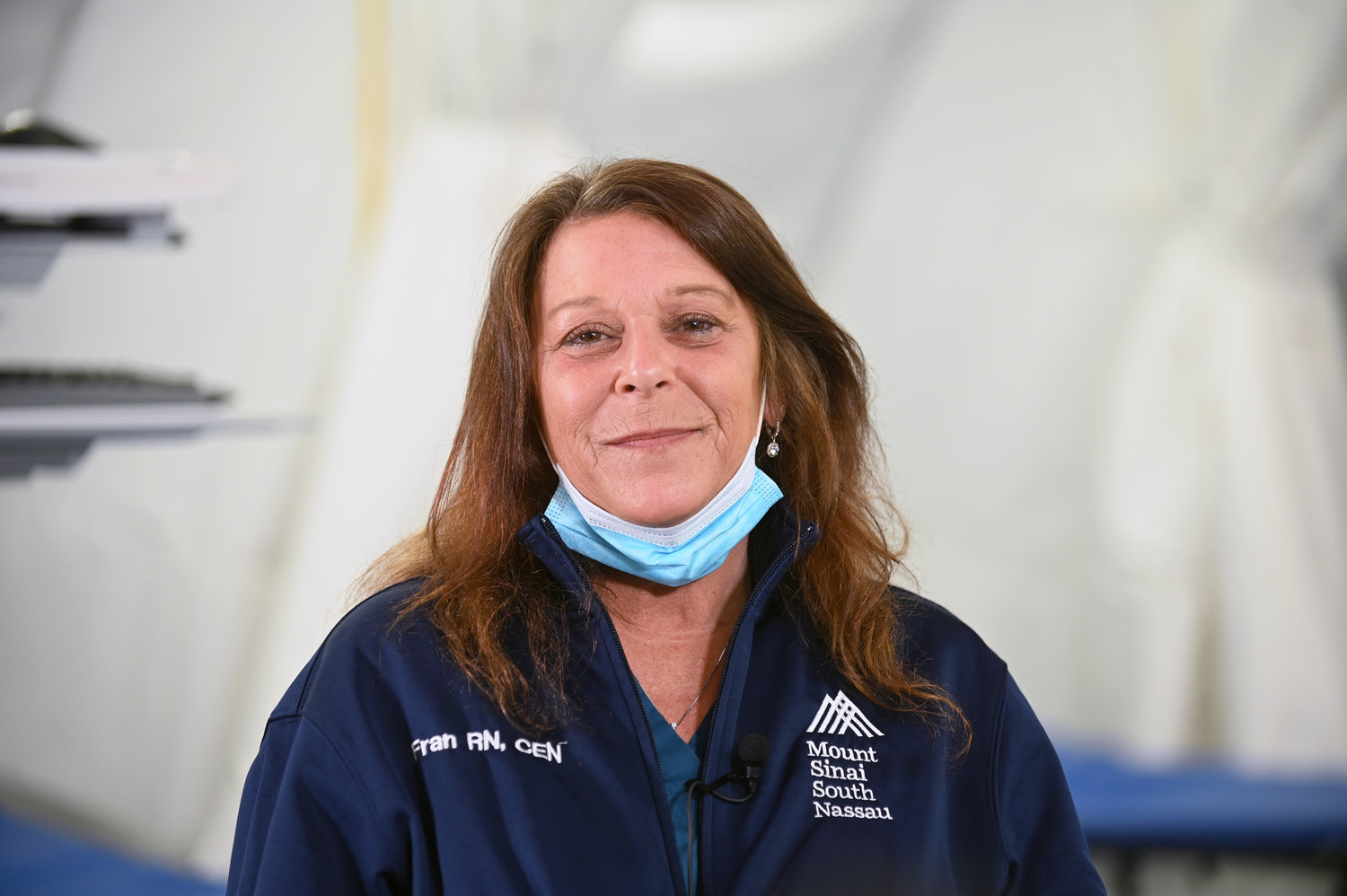Hospital workers share their stories in Mount Sinai South Nassau video series
The nurses and staff at Mount Sinai South Nassau “never wanted to be heroes,” said Fran Stevens, of Merrick, an assistant nurse manager in the emergency department.
In her 35 years working at the Oceanside hospital, Stevens had also never seen such a “ruthless” virus until Covid-19 hit in March. The jobs of doctors and caretakers became more dangerous as they were exposed to coronavirus patients being admitted at high rates.
“In the E.R., we’re on the front-line of the pandemic,” Stevens said. “The majority of people coming into the E.R. did have it, and they were sicker than anything we've ever seen before.”
Stevens was one of about a dozen MSSN workers to share their stories for the hospital’s “Behind the Mask” campaign, a mini documentary and series of videos highlighting people’s lives on the front-line during the pandemic.
The hospital’s external affairs staff partnered with videographer David Handschuh to interview workers inside the triage tent, which was set up in March to accommodate for overflow, around the height of the crisis. The peak at MSSN was on April 13, when there were 383 coronavirus patients being treated there.
The idea for “Behind the Mask” came about when Dr. Adhi Sharma, chief medical officer and executive vice president for clinical and professional affairs, suggested documenting an oral history of the unprecedented challenges the hospital was facing. From there, MSSN partnered with Altice and 16 sponsors to get the video clips on the air. They are now playing on News 12 and 20 other major stations and networks, as well as the hospital’s social media channels.
“A lot of them just talked very openly,” said Dana Sanneman, executive director of public affairs, who conducted the interviews, “and shared stories about what it was like coming to work, leaving work and going home to family.”
This resulted in eight hours of footage, which Sanneman cut down to about an hour and a half for production company Spot On to create 30-second pieces and a four-minute video. With 16 businesses sponsoring the final product, the hospital was able to raise nearly $200,000. The videos also have a call to action at the end, asking viewers to donate. The hospital’s expenses increased during the pandemic, and their usual annual fundraisers, such as Soiree Under the Stars, have been canceled.
“We’re very grateful to our supporters and sponsors who came forward and wanted to both support the hospital,” said Joe Calderone, the hospital’s vice president of corporate communications, “and thought it was important to get [front-line workers’] stories out and give them some well-deserved recognition for their efforts during the pandemic.”
Stevens said she was honored to participate in the “Behind the Mask” series. She thought it was important for people to recognize Covid-19’s devastating impact. “If you’re not in the middle of it and experiencing how ruthless this disease is, it's invisible to you,” she said. “This is the worst disease I’ve ever seen. It does not discriminate — it’s not just old people, it’s young people, and if you’re not seeing the devastation, it’s invisible. That’s why [‘Behind the Mask’] is important.”
At one point, Stevens recalls six patients dying in a span of two hours. Calling the families of the deceased, who could not be present for their loved ones’ last moments of life, was among the most difficult parts of the crisis.
“It’s a heartbreaking time,” Stevens said. “[The staff] had a lot of loss. We cried together, talked to each other, we weren’t alone. You come back the next day and you get through it.”
At the same time coronavirus cases and deaths rose at alarming rates, so did the support felt inside the hospital. Stevens felt comforted by the food donations, cards, drive-by parades and other shows of support — “the community had our back,” she said.
Times of reprieve also came when a coronavirus patient was discharged and the song “Here Comes the Sun” played throughout the hospital, or when a patient came off a ventilator and the hospital played the song “Breathe.”
“When we heard those songs, it made a big difference,” Stevens said. “We knew something positive was coming out of this. We were seeing people go home.”
To hear the stories of other front-line workers, visit Mount Sinai South Nassau’s YouTube page or visit southnassau.org.

 44.0°,
Mostly Cloudy
44.0°,
Mostly Cloudy 




